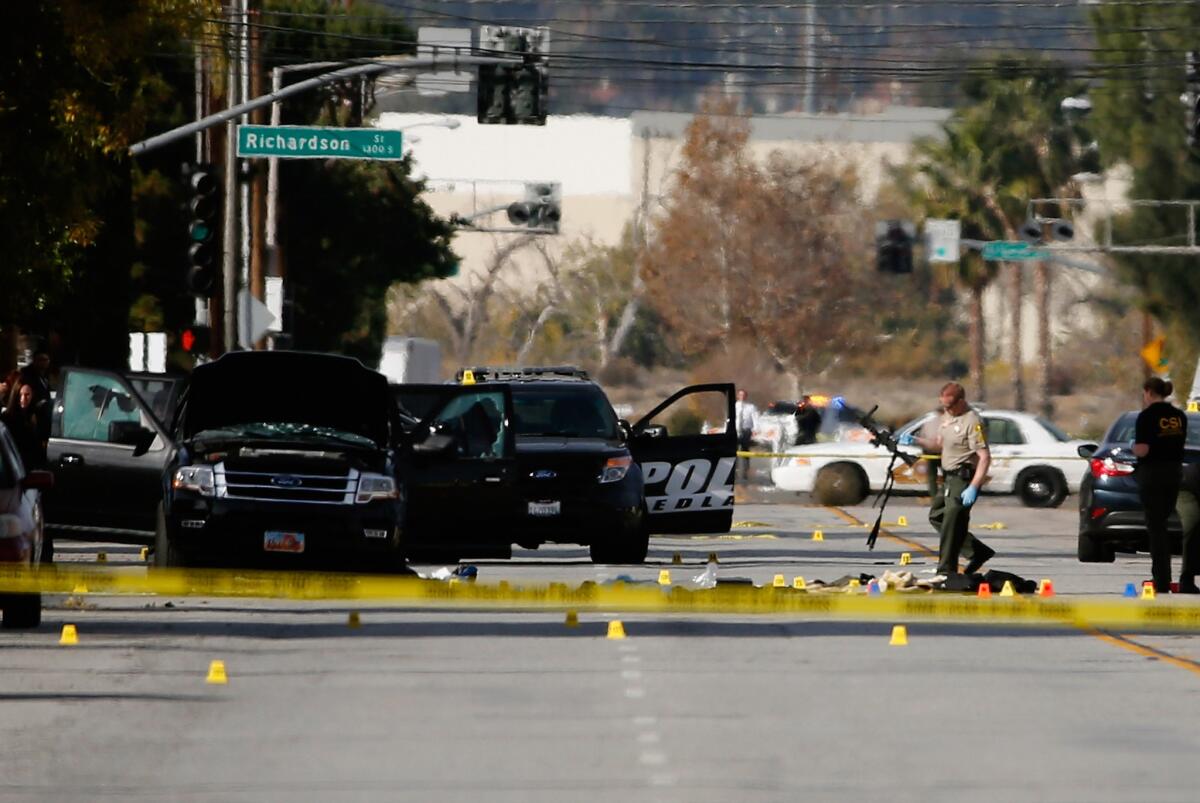What San Bernardino teachers are doing to help their students cope

Evidence collection continues Thursday at the scene where the two suspects in Wednesday’s mass shooting at the Inland Regional Center in San Bernardino were killed in a gun battle with police.
- Share via
As they arrived at school Thursday morning, teachers in San Bernardino received an email from district headquarters -- a tip sheet to guide the conversations that they’d surely have with their students the day after 14 people died and 21 were injured in a mass shooting in their city.
The guidelines encouraged teachers to stick to the facts and to reassure students that they were safe at school and that the school district and school police were committed to keeping them safe. The email also included advice from the National Assn. of School Psychologists on talking to children about violence.
The district has a crisis team to support students and staff in some schools and at the district headquarters, said Laura Strachan, director of alternative programs for the San Bernardino City Unified School district.
The crisis team is trained to deal with situations like this one, and accompanies and observes school police during live shooter trainings.
“We have had other events where there’d be, say, a student’s family involved in a shooting where we would deploy [the crisis team],” Strachan said. “But nothing of this scope.”
How teachers and counselors talk to students will depend on their age and proximity to the attack; regardless of whether they were close to the Inland Regional Center, though, being on lockdown -- as all San Bernardino schools were on Wednesday -- can stoke students’ fear.
Frank Dominguez Elementary School, for example, is close to the attacks and to the site where suspects Syed Farook and Tashfeen Malik were killed in a shootout with police. Members of the district’s crisis team, which consists of counselors and psychologists, were dispatched there, Strachan said.
Students of different ages will absorb different information, Strachan said. Teachers and counselors are told to give younger students in second or third grade more basic information, unless specific questions arise. High school students probably already have access to more graphic details, and there will be a focus on providing them with the facts and making sure the information they have is accurate.
Follow live coverage of the San Bernardino shooting >>
“We do tell the truth,” Strachan said. “We do stick to the facts. We don’t give details that aren’t asked for.” Teachers should not share their opinions or personal experiences, she said.
At San Gorgonio High School, about five miles from the Inland Regional Center, math teacher Patrick Kahler acted as a fact-checker on Thursday. His students asked him questions and mentioned rumors, which he corrected or confirmed.
Kahler was a teacher in South Los Angeles during the Rodney King riots and the Northridge earthquake. That’s where he learned to keep calm during tragedy, to make sure he was giving his students information they needed on the news and the structure they needed in school, he said.
On Wednesday, he heard about the shooting during lunch. By the time his students filed into fifth period around noon, they knew what was happening — lunch had consisted of following the news on their phones, Kahler said.
“That’s when I went into defusing crisis mode,” Kahler said.
He turned on the news on the radio so students could hear, and checked CNN periodically. He allowed students to have their phones out to talk to parents.
“I said, ‘Call your parents, make sure they’re OK.’”
During sixth period, the entire district went on lockdown. Kahler kept abreast of the latest news, but also tried to inject some normality into the class with a lesson on congruent triangles.
Trauma from a mass shooting can be deepened if a student has experienced other trauma that makes them feel unsafe, Strachan said. The students at San Gorgonio are used to personal tragedies, Kahler said — they’ve seen shootings at the park across the street, stabbings on campus, and loss in the community.
“They see violence, they know violence, you rarely find a kid who ever walks home alone,” Kahler said.
Parents should pay attention to their children’s behavior to answer their questions and reassure them of their safety, Strachan said.
“Our biggest piece [of advice] is to reassure the students that they’re safe,” Strachan said. “That we’re making sure their safety is taken care of.”
Reach Sonali Kohli on Twitter @Sonali_Kohli.
MORE ON SAN BERNARDINO SHOOTING
What sets the San Bernardino massacre apart from other such attacks?
San Bernardino suspects ‘sprayed the room with bullets,’ police chief says
Shooting suspect endured turbulent home life, according to court documents
More to Read
Sign up for Essential California
The most important California stories and recommendations in your inbox every morning.
You may occasionally receive promotional content from the Los Angeles Times.










